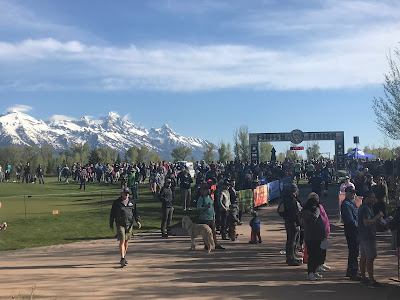Last night's rain pushed our first vertical cutting of the putting greens to this morning. As you can see from the photo below the process is minimally invasive, but we are still able to remove a large quantity of organic matter from the thatch layer. This serves many functions: improves firmness, increases green speed, improves water infiltration, and reduces disease potential. The putting greens are then traditionally mowed (horizontally) in order to "clean up" and smooth out the surface.
 |
| Close up of the putting green surface after vertical cutting; before the traditional mow. |
The turf maintenance team uses Growing Degree Day (GDD) or Growing Degree Unit (GDU) models to predict plant growth. This is essentially a cumulative measurement of the "good growing weather" for a period of time. This helps us to properly time cultural practices like vertical mowing in addition to fertilizer and chemical applications. We all have a good feeling that this year we have seen a slow spring. To put it in Growing Degree Units in 2019 we have a current total 79.5 GDDs versus this same date last year in which we had 141.5 GDDs. There may be some yawning and eye rolling as you read this, but if you could take away one thing: this model helps us disturb the golf course (and your round) as little as possible.
Our putting greens seem perform at their peak when vertical cutting is performed at approximately a 350 GDD interval. Or in other words, this process will be repeated about mid-July and we aim to perform this four to five total times in a given season.
Current research on organic matter accumulation in turfgrass suggests that if vertical cutting and sand topdressing are performed to match the growth rate of the turf, required aeration events could be reduced or even eliminated in rare occurance... and I know we all like hearing that.
All this science has its purpose. Through diligent soil sampling, the use of growing degree day models, and a touch of horticultural instinct our long term goal is to refine our putting green management practices to achieve something very few in the golf course industry can do: reduce or eliminate (if possible) the need for aeration practices while still maintaining a high performance putting surface.

